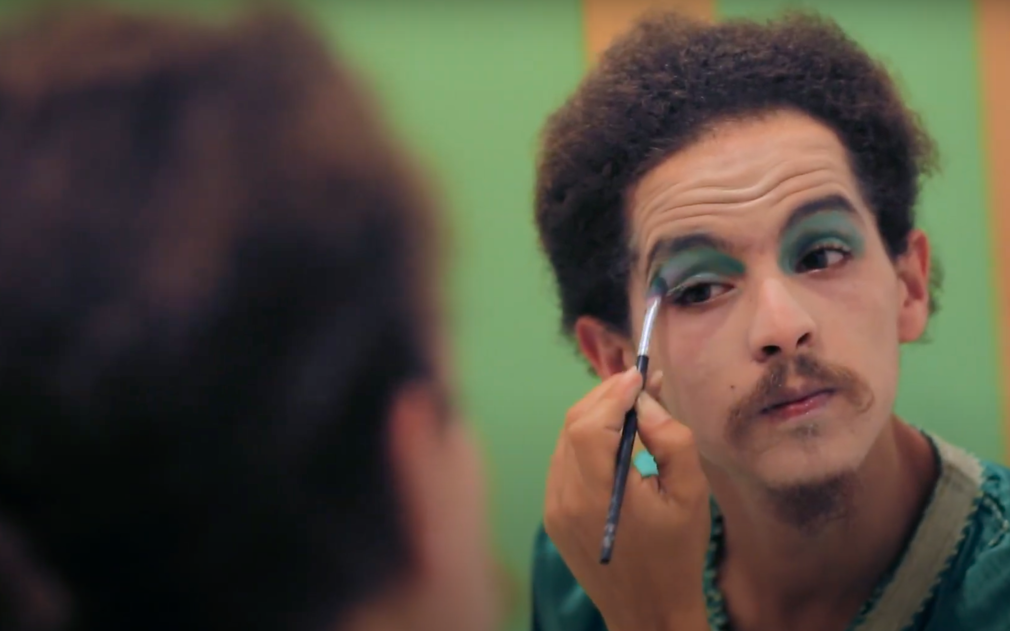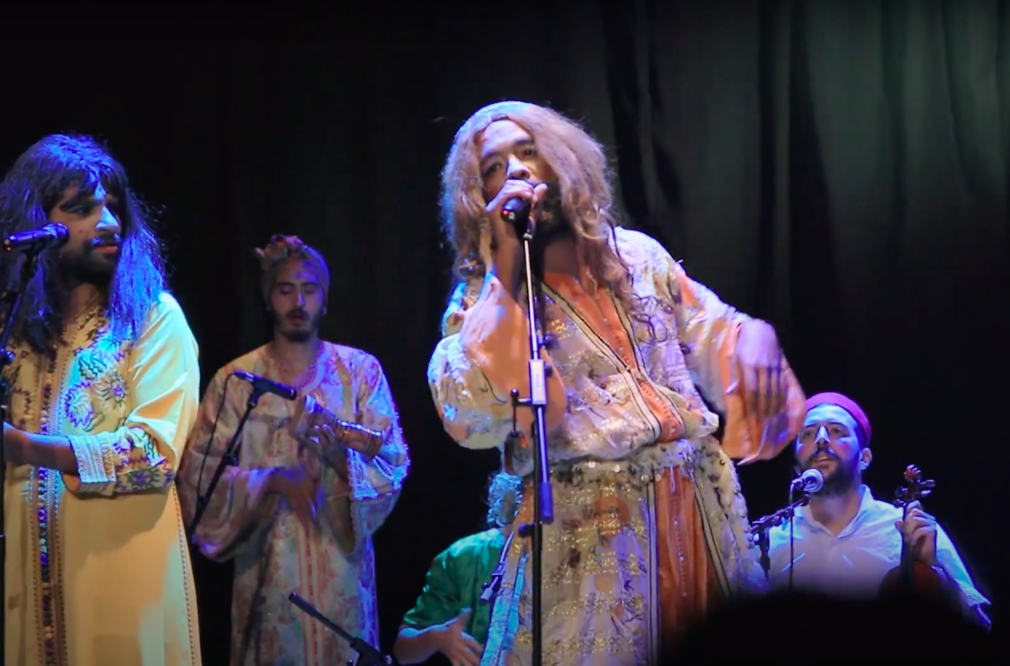PAM presents: Ghassan El Hakim and the Kabareh Cheikhats
This new episode in our Off the Map series takes you to Casablanca, behind the scenes of a musical theater company. Directed by Ghassan El Hakim, the film pays tribute to the cheikhats, popular singers of the past who practiced the aïta song. A film by Jessy Nottola.
A dozen men, in satin suits embellished with embroidery, make-up and jewels, are having a blast on stage. Dressed as women, but with the beards and mustaches they wear in everyday life, they pay tribute to an old Moroccan tradition, the aïta – a poetic and popular song from the countryside that tells the story of Moroccan life. It was women who made it famous when the aita moved from the countryside to the cities of the kingdom, singing at weddings and other traditional celebrations, and for some, at the parties of large families. And it is this heritage that the Kabareh Cheikhats brings back to life. Ghassan El Hakim, who returned to Morocco after his studies in Paris, began working on this project in 2014 and three years later, his Kabareh went on stage for the first time. He is the one who guides us through the film, our fifth episode of the Off the Map series, to an encounter with Casablanca, a “slightly punk” city, and to the discovery of the troupe, exclusively male, passionately turned towards these artistic female figures that are the cheikhats.
Jessy Nottola, the director of the film, heard about the Kabareh Cheikhats and his curiosity was immediately piqued: “I said to myself: Wow, guys who cross-dress in a society like Morocco, why do they do that? What does it mean?” A few phone calls later with Ghassan El Hakim, he arrives in Casablanca, the economic capital, as the troupe is about to give a concert. Rehearsals, a car trip to Rabat, dressing and make-up backstage, then the troup enters the stage: “Close the curtain / put out your cigarette, Oh my God! make of me the lunar crescent which will agree with your shade” Ghassan el Hakim sings, under the lights in the middle of his band.

As he explains in the film: “The real birth of Kabareh Cheikhats was when we played (for the first time). The night before I was sleeping, and I said to myself, ‘You’re a little crazy to do this. You put ten people on stage, dressed as women and wearing make-up, and I said to myself: we are going to be stoned. There is a second voice that says to me: what do you know? you are not doing anything wrong (…) During the rehearsals I was playing and singing, I said to myself that I was going to go up on stage, not to leave them alone if they get stoned, I am going to take the stones too.”
Venerable cheikhats
In a society where “masculine virility” is magnified, one could fear negative reactions. But at the same time, as Jessy Nottola explains: “I remember that the Cheikhats, to whom they pay homage by dressing like them, is a very old story. It survived the colonists who had suppressed many things, and it has been a good century that this female disguise is tolerated in Morocco. Someone like Bouchaib El Bidaoui, actor and singer, has imitated these women. Ghassan was struck by archival footage from the 1960s, from the show that El Bidaoui hosted on TV and that amused everyone.”
It is by wanting to revive this tradition of the Cheikhats, and the men who dress like them, take up their often transgressive songs (evoking daily life, the failings of society, the abuses of power, and gallant or saucy subjects) that Hassan el Hakim set out to find in the old repertoires, those of before the influence of Egyptian films. We see him in the film, on the terrace of La Parallèle, the art school he founded, talking to his troupe about this Egyptian way of singing “which has made us forget the essence of the aita, that is to say the speaking-singing“. Because there is in these songs a part of the memory and the popular history of Morocco, one that better explains a people than the chronology of facts and gestures of this great world.
Obviously, one thinks also of the song of the medahates which, carried by the Cheikhs and Algerian Cheikhas, would finish by giving birth to raï, and of which Cheikha Remitti was one of the most emblematic figures. She too, like her sisters in Morocco, was adored as much as despised. “Often, the Cheikhats were marginalized. There was mockery in their songs of the gallant poetry, of the vulgarity also…(…) and when men cross-dress to sing, it’s like when the clown takes the dress of clown to become a clown… to dress in cheikhat it allows you to say things you couldn’t say in other contexts.“
Ghassan El Hakim and his friends, since they took to the stage and resurrected the poetic ghosts of the Cheikhats of yesteryear, have taken their show not only to their country, but have made these venerable ladies shine beyond the shores of the Mediterranean (in France, Belgium, the United Kingdom…).
Enter the universe of this singing theater troupe via PAM’s Youtube channel where you can also find the other episodes of Season 1 of Off the Map.
